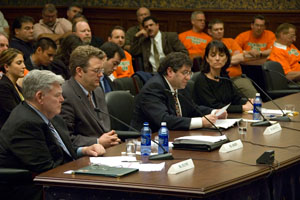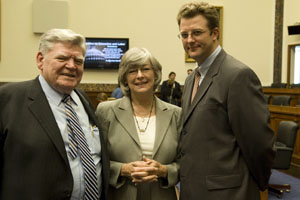MCAA Testifies Before Congress

Some unscrupulous contractors around the country are misclassifying workers as “independent contractors” in an effort to save money and cut costs. This illegal practice is leaving honest law abiding contractors at a huge competitive disadvantage.
Recently, on March 27th Cliff Horn, President of A. Horn Inc. testified on behalf of the Mason Contractors Association, in front a House Education and Labor subcommittee, regarding the impact this illegal practice is having on the masonry industry and the construction industry as a whole.
In her opening statement Chairwoman of the subcommittee, Congressman Lynn Woolsey (D-CA), stated “The practice hurts everyone: workers who are not afforded the protection of labor laws; honest contractors who can’t compete with contractors who misclassify their workers in order to lower their costs; and all of society as state and federal governments lose millions of dollars in revenue each year.”
Chairwoman Woolsey commented “The U.S. Department of Labor has stated that the number one factor for employers in misclassifying workers is the desire to avoid paying workers comp premiums and to otherwise avoid workplace injury and disability disputes.”
The construction industry has been faced with this problem for years, however, it has become chronic and is reaching epic proportions. Contractors who are intentionally misclassifying their workers as “independent contractors” avoid payments to the state workers compensation fund, unemployment insurance and Medicare. Horn testified “Businesses that misclassify employees as “independent contractors” can expect to reduce their labor costs between 15 and 30 percent.” Horn said, “This places contractors like myself at a competitive disadvantage in an industry with 20% gross margins.” “The misclassification of workers has impacted my business and is impacting the construction industry at the local, state and federal level,” Horn continued.
In his testimony Mr. Horn also highlighted the fact that there are legitimate independent contractors in the Construction Industry and that “it was not his intention to undermine those sole proprietorships and small businesses.” Horn said “the problem is the intentional misclassification of individuals who are in fact employees but are classified as “independent contractors” by unscrupulous employers.”
John Flynn, President of the International Union of Bricklayers and Allied Crafts also testified before the subcommittee. Flynn commented in his testimony that “by misclassifying employees as independent contractors, unscrupulous employers avoid labor and employment laws, prevailing wage laws, and other legislation intended to ensure that workers are dealt with in a fair and equitable manner.”

The Subcommittee on Workforce Protections determined this issue was worthy of Congressional action after numerous problems around the country. In Illinois, where Mr. Horn’s company is based, state and federal agencies are investigating allegations that some Chicago area construction companies are deliberately misclassifying workers as “independent contractors” instead of employees, illegally boosting company profits and depriving the state and federal government of tens of millions in tax revenue. The University of Missouri-Kansas City, Department of Economics recently released a report estimating that in Illinois alone, $124.7 million in income tax was lost annually from 2001 through 2005, and $8.9 million a year was lost in the construction sector because of misclassification.
The report also estimated that on average $95.9 million annually of workers compensation premiums weren’t properly paid for misclassified workers - $23.2 million of that underpaid by construction industry employers.
Horn demonstrated in his testimony that in addition to depriving workers of their legal rights and the government of payroll taxes, such employers raise safety and health issues by not paying workers’ compensation premiums. “If some contractors are skirting around workers’ compensation, then the firms who properly classify employees are forced to carry the load,” he said “If workers’ compensation is unavailable to a worker, then our health care system has to absorb the cost.”
Although, this practice is a particular problem in the construction industry, it is not confined to the building trades. Catherine Ruckelshaus, a lawyer with the National Employment Law Project in New York, testified that she has worked on cases around the country involving misclassification of workers. In particular Ruckelshaus described a case in New York which involved delivery workers for a grocery chain who were misclassified as “independent contractors” and paid $90 a week despite working full-time hours. As a solution to the problem Ruckelshaus urged better and more coordinated enforcement by the Department of Labor’s wage and Hour Division and the Internal Revenue Service to crack down on employers that misclassify workers in order to evade federal wage and overtime laws as well as payroll taxes.
Congressman Tim Bishop (D-NY) remarked that state laws in Massachusetts and New Mexico presume an employer-employee relationship and asked if that would work in the construction industry. Ruckelshaus responded that “If it’s at the state level it can work very well,” however, she continued she “was unsure how such a presumption would work at the federal level.” She again emphasized that federal agencies need to improve enforcement of current law. Making the Labor Department’s efforts “more strategic and more targeted” is essential she said.
Congressman Tom Price (R-GA) asked Mr. Horn if Congress needs to define more clearly the independent contractor/employee distinction. “A lot of the rules are in place; they just need to be enforced.” Horn replied. More education for workers on the issue also might be helpful” he said. Employers are well aware when they are doing something wrong,” he said.
Chairwoman Woolsey concluded the hearing stating that members of the Subcommittee will be sending a letter to the Department of Labor requesting details on its current enforcement efforts. She added, if the subcommittee is dissatisfied with DOL’s response, oversight hearings will follow.
About the Author
Jessica Johnson Bennett was the Director of Government Affairs for MCAA. She has an extensive background in public affairs and government relations. Her expertise in strategic planning, PAC management and operations help on key policy issues.


















